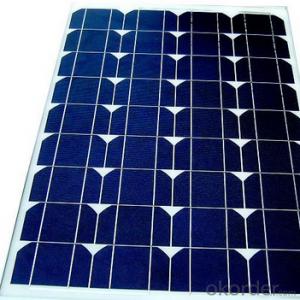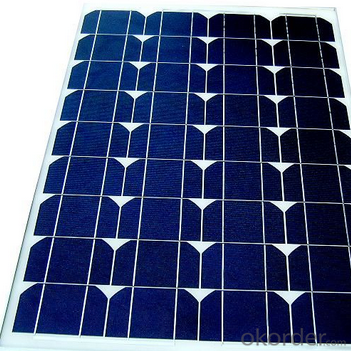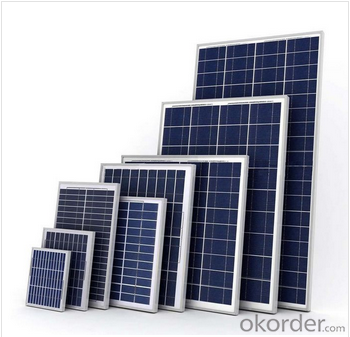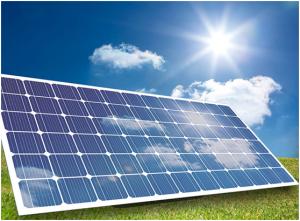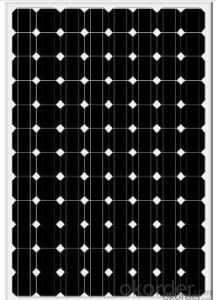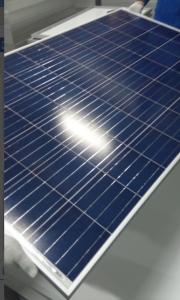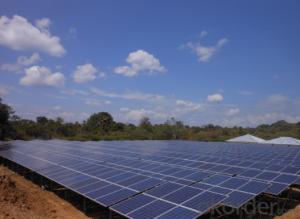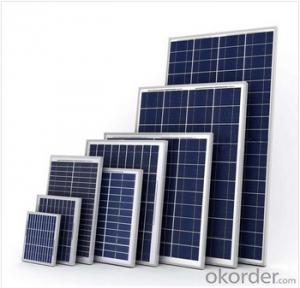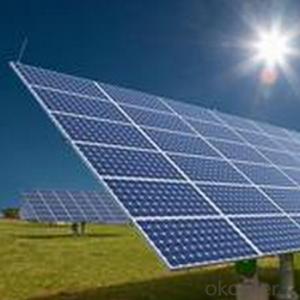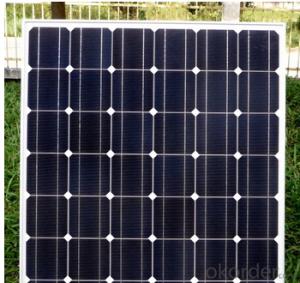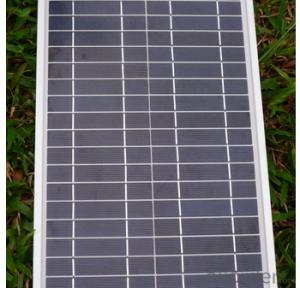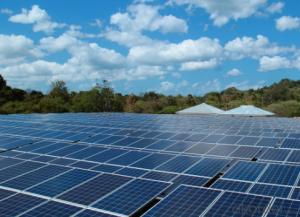High Power Poly Solar Panel/Module - Ice 40 for The Home
- Loading Port:
- China main port
- Payment Terms:
- TT OR LC
- Min Order Qty:
- 200 watt
- Supply Capability:
- 50000 watt/month
OKorder Service Pledge
OKorder Financial Service
You Might Also Like
Instruction
Format : 156 mm × 156 mm ± 0.5 mm
Thickness: 210 μm ±40 μm
Feature
1. High efficiency and High power.
2. Long-term electrical stability.
3. Lowest price and Fastest delivery.
4. Good quality and best service.
5. Bulk supply
Images
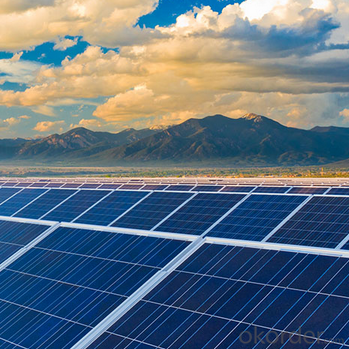
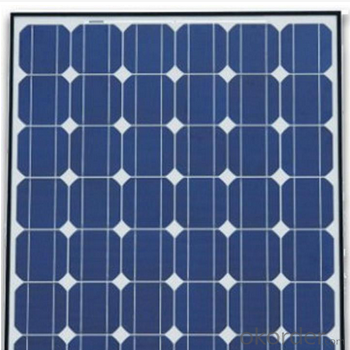
Specification
Electrical Characteristic of Mono Solar Cells
Model Type | |
Peak Power-Pmax(W) | 185 |
Open Circuit Voltage-Voc(V) | 44.2 |
Maximum Power Voltage-Vmp(V) | 36 |
Short Circuit Current-Isc(A) | 5.4 |
Maximum Power Current-Imp(A) | 5 |
Maximum System Voltage | 1000V DC |
Maximum Series Fuse Rating | 10A |
Power Tolerance | -1~+3% |
Temperature Coefficients of Pmax | -0.45%/℃ |
Temperature Coefficients of Voc | -0.348%/℃ |
Temperature Coefficients of Isc | 0.031%/℃ |
Nominal Operating Cell Temperature | 44.5±2℃ |
Standard Testing Condition(STC) | Irradiance:1000W/m²;Temperature:25℃;AM=1.5 |
Qualification Test Parameters | |
Operating Temperature | -40℃~+85℃ |
Storage Temperature | -40℃~+85℃ |
Pressure Bearing | ≥5400Pascal/m² |
Wind Bearing | ≥5400Pascal/m² |
Mechanical Characteristics | |
Cell Size | Mono 125*125mm±0.5 |
No.of Cells | 72pcs(6*12) |
Dimension | 1580*808*40mm |
Weight | 15.5Kg |
Glass | 3.2mm High Transmission,Low Iron |
Frame | Anodized Aluminum Alloy |
Junction Box | IP65Rated |
Internal Diodes | 3 Bypass Diodes |
Cable | 1*4.0mm² Length 900mm |
FAQ
We have organized several common questions for our clients,may help you sincerely:
1. What’s price per watt?
A: It’s depends on the quantity, delivery date and payment terms of the order. We can talk further about the detail price issue. Our products is high quality with lower price level.
2. Can you tell me the parameter of your solar cells?
We have different series of cells with different power output, both from c-si to a-si. Please take our specification sheet for your reference.
3. How do you pack your products?
We have rich experience on how to pack the panels to make sure the safety on shipment when it arrives at the destination.
- Q: Do solar panels require regular inspections or maintenance checks?
- Yes, solar panels do require regular inspections and maintenance checks to ensure optimal performance and longevity. These inspections typically involve checking for any potential damage, dirt or debris accumulation, and monitoring the efficiency of the system. Regular maintenance checks may include cleaning the panels, inspecting wiring and connections, and testing the functionality of inverters and other components. By conducting these inspections and maintenance checks, any issues can be identified and resolved promptly, maximizing the efficiency and lifespan of the solar panel system.
- Q: I am working on a project and I have to build a house with solar panels. My teacher asked me how would I get solar energy if it is rainy or cloudy? I looked it up but didn't understand. Please help me!!
- Solar panels convert light energy into electrical energy with the photovoltaic process. They work best when perpendicular to the incoming sunlight and with no clouds in bright sunlight. They will work at reduced efficiency if there are clouds or rain, but as long as its not dark, they will still produce some electricity. That is one of the real problems with solar energy, as we expect to have electricity available on demand, regardless of day/night cycles and atmospheric conditions. Storing electricity is very inefficient, so we need hydro, nuclear,or fossil fuel energy to provide firm on demand energy as a base load.
- Q: Can solar panels be installed on bus stops or shelters?
- Yes, solar panels can be installed on bus stops or shelters. In fact, many cities around the world have already implemented solar-powered bus stops and shelters as a sustainable solution to provide clean energy and reduce the environmental impact of public transportation systems. These solar panels can generate electricity to power lighting, information displays, charging stations, and even provide energy back to the grid.
- Q: What is the difference between Photovoltaic Panels and Solar Panels?
- Dear friend, Photovoltaic Panels and Solar Panels are the same products.
- Q: How much space is needed to install solar panels?
- The amount of space needed to install solar panels varies depending on factors such as the size of the panels, the efficiency of the system, and the energy requirements of the property. On average, a typical residential solar panel system requires about 100-400 square feet of roof space per kilowatt of installed capacity. However, it's important to consult with a solar installer to determine the specific space requirements for your property.
- Q: Can solar panels be used in areas with high temperatures?
- Yes, solar panels can be used in areas with high temperatures. In fact, solar panels are designed to withstand a wide range of temperatures, including high heat. However, it is important to note that excessive heat can slightly reduce the efficiency of solar panels. Therefore, proper installation and regular maintenance are crucial to ensure optimal performance in hot climates.
- Q: Is there a material that is capable of absorbing enough UV radiation to make it worth using as a flexible solar cell?Not flexible as in aluminum, but a material such as plastic (polycarbonate).
- Yes, they already exist. I have one here.
- Q: It measured volts before I attached it, and after attaching the voltage regulator device, the voltage dropped down to 3 volts, even when just measuring the difference in the solar panels nodes themselves, suggesting that the entire panels voltage dropped and not just the voltage in the regulator. I tried testing it with a power supply of 7 V 0. A and it works fine, but I don't know why it won't work for the solar panel.
- you cannot treat the open circuit voltage of a solar panel like a voltage source (like a battery.) the load response of the panel doesn't behave that way. small panels and panels that are producing less than about .5A are very happy to have their output voltage pulled down to whatever they're connected to (typically zero.) I observed the same phenomenon when i connected a 2V 725mA panel to a 2V 325mA fan -- the open circuit voltage of 5V dropped to 3V when connected to the fan, and returned to 5V when disconnected. The easiest workaround is to use 2V of rechargable batteries in parallel with the panel so that the battery holds the 2V potential difference and the panel just supplies the current. any excess current charges the batteries, so you might consider whether or not you need some type of charge controller to prevent burning the batteries via overcharging. there are actually very few applications of solar panels connected directly to circuits that i have seen that have any kind of robust performance -- if they work at all, they eventually die/burn themselves out in a couple of months. the best robust designs always have a rechargable battery and charge controller somewhere in the power circuitry to buffer the load circuit from the panel. .
- Q: Can solar panels be used to power streetlights or outdoor lighting?
- Yes, solar panels can be used to power streetlights or outdoor lighting. Solar-powered streetlights or outdoor lighting systems consist of solar panels that capture sunlight and convert it into electricity, which is stored in batteries. This stored energy is then used to power the streetlights or outdoor lighting during the night or when there is insufficient sunlight. Solar-powered streetlights offer a sustainable and cost-effective solution for outdoor lighting, reducing energy consumption and carbon emissions.
- Q: Has anyone had any experience building their own solar panels for home use? I have seen on the news lately that people are utilizing solar panels to power their hot water heaters to save on their power bill.
- The technologies of the photograph voltaic panels is a lot previous any DIY undertaking. you ought to purchase pre-assembled panels and set up them, yet you in addition to mght choose the units to make the DC they generate into the AC your place desires. additionally you will choose the batteries for the nights and the cases while the solar does not shine. photograph voltaic/ photograph voltaic technology does artwork yet isn't a miles less high priced thank you to decrease your reliance on the electrical powered grid as of this time. They fee 2 hands and a leg, and take some years yet to come back on the brink of wreck even on the electrical powered mark downs. Do a seek on the quantity of skill each and every panel will generate and then compute how lots skill you like and what the expenditures are. i think in photograph voltaic skill, yet no longer for somebody place of abode is it sensible. stable success.
Send your message to us
High Power Poly Solar Panel/Module - Ice 40 for The Home
- Loading Port:
- China main port
- Payment Terms:
- TT OR LC
- Min Order Qty:
- 200 watt
- Supply Capability:
- 50000 watt/month
OKorder Service Pledge
OKorder Financial Service
Similar products
Hot products
Hot Searches
Related keywords
